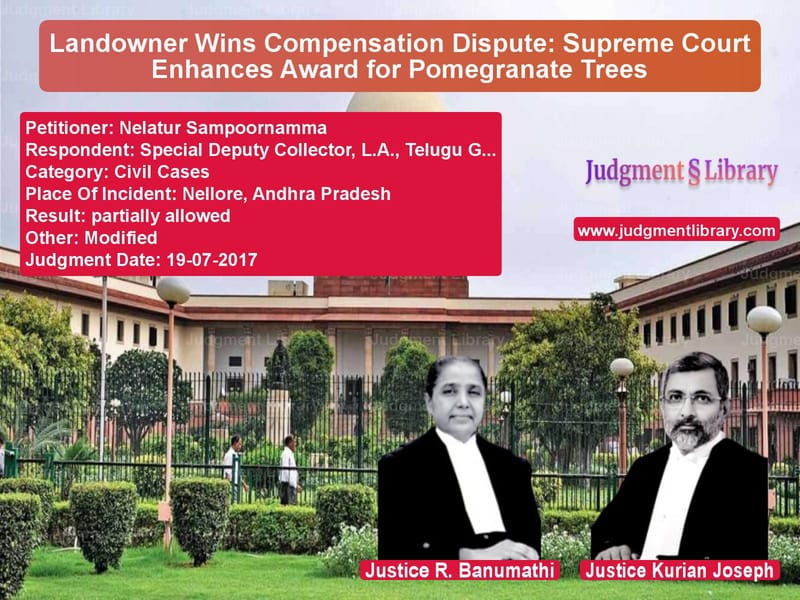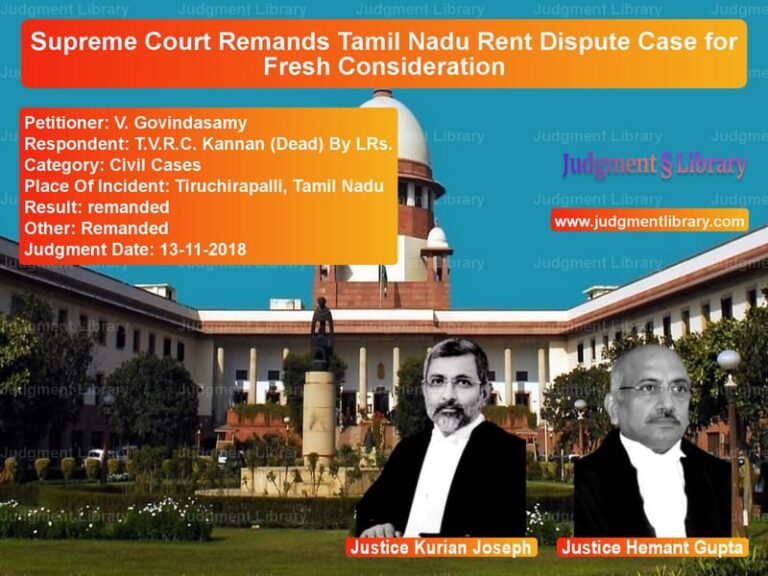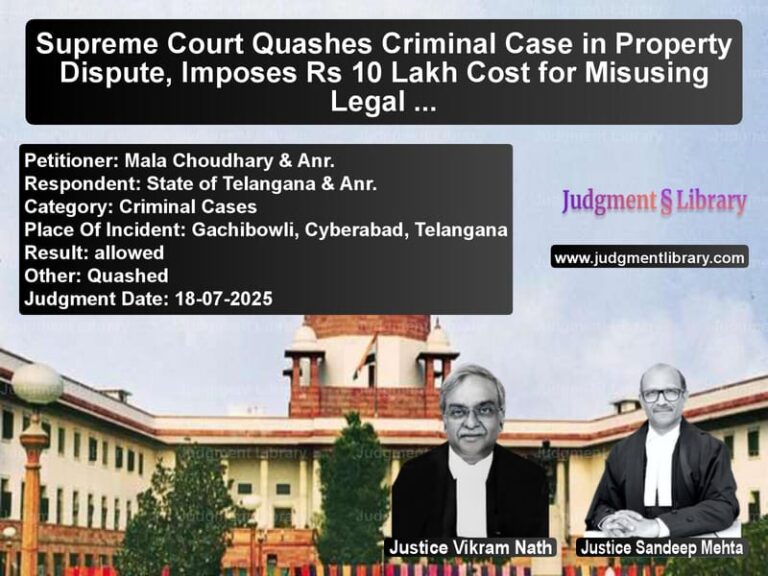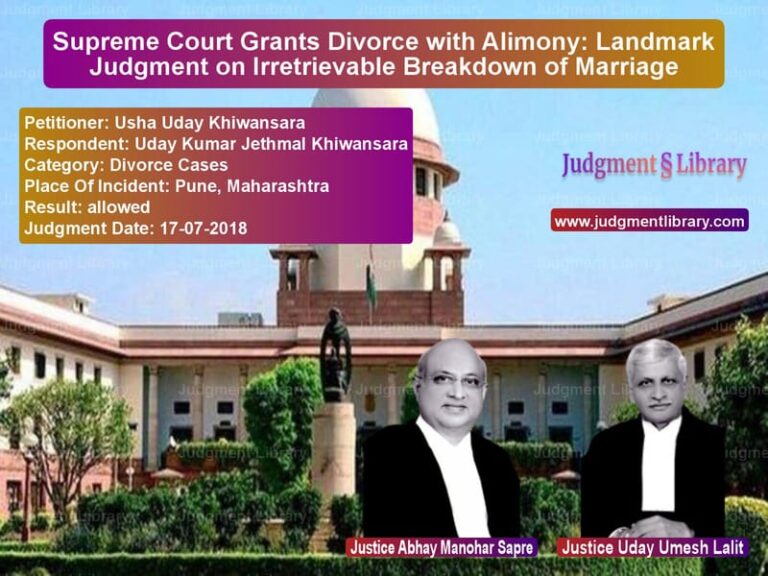Landowner Wins Compensation Dispute: Supreme Court Enhances Award for Pomegranate Trees
The case of Nelatur Sampoornamma vs. Special Deputy Collector, L.A., Telugu Ganga Project, Podalakur at Nellore revolves around a dispute concerning compensation for land acquired by the Andhra Pradesh government under the Telugu Ganga Project. The appellant, a landowner, challenged the compensation awarded for 45 pomegranate trees, arguing that the valuation method used by the authorities was flawed and unfair. The Supreme Court ultimately modified the compensation, increasing the awarded amount significantly.
Background of the Case
The government of Andhra Pradesh initiated the Telugu Ganga Project, a major irrigation scheme that required acquiring large tracts of land. The Executive Engineer of the Telugu Ganga Project at Nellore sent a requisition for the acquisition of land in Dachur Village for foreshore submersion under the Kandelara Reservoir. The total acquired land spanned 56.53 acres, out of which 30.85 acres were privately owned patta land.
The appellant owned a small portion of this land, measuring 0.15 acres, in Sy. No.592/2, which contained 45 fruit-bearing pomegranate trees. The acquisition notification under Section 4(1) of the Land Acquisition Act, 1894, was issued on March 30, 1990. The authorities eventually passed an award on September 14, 1992, fixing the market value of the land and trees.
Dispute Over Compensation
The dispute primarily centered on the valuation of the pomegranate trees. The Land Acquisition Officer (LAO) assessed the compensation using outdated rates. The initial award provided the following compensation:
- Market value of dry land: Rs.7,500 per acre (Rs.1,125 for 0.15 acres).
- Compensation for pomegranate trees: Rs.42.17 per tree.
The appellant argued that this valuation was far below the actual market value. She contended that the proper valuation method should consider the fruit-bearing potential of the trees and the annual yield.
Legal Proceedings
Reference Court Findings
The appellant challenged the award under Section 18 of the Land Acquisition Act, seeking a reference to the Civil Court. The case was heard by the Senior Civil Judge, Gudur, Nellore District. The Reference Court made the following observations:
- The valuation of each tree at Rs.42.17 was too low.
- The proper method of valuation should have been the capitalization method.
- Each pomegranate tree should be valued at Rs.65, based on updated government guidelines.
- The appropriate multiplier for income projection should be “2,” as per G.O. Ms. No.601.
Accordingly, the Reference Court enhanced the compensation and awarded additional benefits, including solatium and interest.
Appeal Before the High Court
Dissatisfied with the Reference Court’s decision, the appellant approached the Andhra Pradesh High Court through L.A.A.S. No.989/2007. The High Court partially allowed the appeal, modifying the valuation method:
- Confirmed the income per tree as Rs.65.
- Increased the multiplier from “2” to “9” (recognizing the longer fruit-bearing period).
The final compensation awarded was Rs.26,325 (45×65×9).
Supreme Court’s Ruling
Aggrieved by the High Court’s ruling, the appellant filed a special leave petition before the Supreme Court, arguing that the valuation should have been based on higher rates. The key arguments presented were:
Appellant’s Arguments
- The valuation should have considered the fruit-bearing capacity of 12 years instead of 9 years.
- The net annual yield per tree should have been calculated as Rs.300 instead of Rs.65.
- The capitalization method used in similar cases, such as Civil Appeal Nos. 11404-405 of 2016, should be applied.
- The reduction of 10% for irrigation issues was unwarranted, as the land had access to well irrigation.
Respondent’s Arguments
- The multiplier of “9” was correct, as the trees were three years old and had nine remaining fruit-bearing years.
- The award in Civil Appeal Nos. 11404-11405 of 2016 was not applicable as it pertained to a different project and timeframe.
Supreme Court’s Analysis
The Supreme Court agreed with the appellant’s contention that the valuation should have been higher. The Court made the following critical observations:
- The Reference Court and High Court erred in using outdated valuation guidelines.
- The revised valuation in Letter No. F(3) 2164/89, dated November 26, 1989, fixed the pomegranate tree rate at Rs.75, which should have been considered.
- The High Court correctly applied a multiplier of “9” but undervalued the per-tree income.
- Given the rising costs of cultivation, a fair compensation for each tree should be Rs.2,000.
Final Compensation
The Supreme Court modified the compensation, awarding:
- Rs.2,000 per pomegranate tree (for 45 trees).
- Statutory benefits including solatium and interest.
Conclusion and Implications
The Supreme Court’s judgment underscores the importance of using accurate valuation methods in land acquisition cases. The ruling sets a precedent for fair compensation for agricultural landowners affected by government projects. By ensuring proper valuation of fruit-bearing trees, the Court has provided relief to farmers and landowners who face displacement due to public projects.
This decision highlights the need for government authorities to adopt fair compensation mechanisms, considering market trends and inflation in agricultural investments. The ruling also serves as a reminder that courts should scrutinize outdated compensation guidelines to prevent financial losses to landowners.
Don’t miss out on the full details! Download the complete judgment in PDF format below and gain valuable insights instantly!
Download Judgment: Nelatur Sampoornamma vs Special Deputy Colle Supreme Court of India Judgment Dated 19-07-2017.pdf
Direct Downlaod Judgment: Direct downlaod this Judgment
See all petitions in Property Disputes
See all petitions in Damages and Compensation
See all petitions in Judgment by R. Banumathi
See all petitions in Judgment by Kurian Joseph
See all petitions in partially allowed
See all petitions in Modified
See all petitions in supreme court of India judgments July 2017
See all petitions in 2017 judgments
See all posts in Civil Cases Category
See all allowed petitions in Civil Cases Category
See all Dismissed petitions in Civil Cases Category
See all partially allowed petitions in Civil Cases Category







